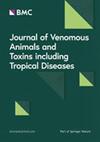一种新蝮蛇的毒液的生化和蛋白质组学分析
IF 1.8
3区 医学
Q4 TOXICOLOGY
Journal of Venomous Animals and Toxins Including Tropical Diseases
Pub Date : 2022-04-11
DOI:10.1590/1678-9199-JVATITD-2021-0080
引用次数: 4
摘要
背景:最近在泰国北部和西北部发现了一种新的坑毒蛇Protobothrops kelomohy。由于它们的毒液具有高度的血液毒性,在几个亚洲国家被其他原始人所感染已经成为严重的健康问题。然而,管理P. kelomohy咬伤是必要的,因为没有特定的抗蛇毒血清可用。本研究的目的是研究泰国棘球鳗毒液(PKV)的生化特性和蛋白质组学,包括其与抗蛇毒血清的交叉中和作用。方法:用3种单价抗蛇毒血清(TAAV、DSAV、CRAV)和1种多价抗蛇毒血清(HPAV)对PKV的中和能力(ER50)、致死率(LD50)、促凝和出血作用进行评价。对其酶活性进行了测定,并与黄斑Trimeresurus albolabris (TAV)、Daboia siamensis (DSV)、Calloselasma rhodostoma (CRV)的毒液进行了比较。SDS-PAGE分离分子质量,western blotting测定特异性蛋白。利用基于质谱的蛋白质组学分析毒液蛋白质分类。结果:PKV静脉LD50为0.67µg/g。HPAV、DSAV和TAAV对PKV的中和作用ER50分别为1.02、0.36和0.12 mg/mL。PKV具有促凝作用,最小凝血剂量为12.5±0.016µg/mL,最小出血性剂量为1.20±0.71µg/只。与TAAV、DSAV和CRAV相比,HPAV对PKV的促凝和出血作用具有显著的中和作用。四种毒液的酶活性均表现出显著差异。PKV蛋白组显示了11类蛇毒蛋白,主要是金属蛋白酶(40.85%)、丝氨酸蛋白酶(29.93%)和磷脂酶A2(15.49%)。结论:在本研究中,PKV的酶活性与其他毒蛇毒液的血毒特性相似。三种主要的毒液毒素在PKV中毒中引起凝血功能障碍。抗蛇毒HPAV被认为能有效中和PKV的致死性、促凝和出血作用。本文章由计算机程序翻译,如有差异,请以英文原文为准。
Biochemical and proteomic analyses of venom from a new pit viper, Protobothrops kelomohy
Abstract Background: A new pit viper, Protobothrops kelomohy, has been recently discovered in northern and northwestern Thailand. Envenoming by the other Protobothrops species across several Asian countries has been a serious health problem since their venom is highly hematotoxic. However, the management of P. kelomohy bites is required as no specific antivenom is available. This study aimed to investigate the biochemical properties and proteomes of P. kelomohy venom (PKV), including the cross-neutralization to its lethality with antivenoms available in Thailand. Methods: PKV was evaluated for its neutralizing capacity (ER50), lethality (LD50), procoagulant and hemorrhagic effects with three monovalent antivenoms (TAAV, DSAV, and CRAV) and one polyvalent (HPAV) hematotoxic antivenom. The enzymatic activities were examined in comparison with venoms of Trimeresurus albolabris (TAV), Daboia siamensis (DSV), Calloselasma rhodostoma (CRV). Molecular mass was separated on SDS-PAGE, then the specific proteins were determined by western blotting. The venom protein classification was analyzed using mass spectrometry-based proteomics. Results: Intravenous LD50 of PKV was 0.67 µg/g. ER50 of HPAV, DSAV and TAAV neutralize PKV at 1.02, 0.36 and 0.12 mg/mL, respectively. PKV exhibited procoagulant effect with a minimal coagulation dose of 12.5 ± 0.016 µg/mL and hemorrhagic effect with a minimal hemorrhagic dose of 1.20 ± 0.71 µg/mouse. HPAV was significantly effective in neutralizing procoagulant and hemorrhagic effects of PKV than those of TAAV, DSAV and CRAV. All enzymatic activities among four venoms exhibited significant differences. PKV proteome revealed eleven classes of putative snake venom proteins, predominantly metalloproteinase (40.85%), serine protease (29.93%), and phospholipase A2 (15.49%). Conclusions: Enzymatic activities of PKV are similarly related to other viperid venoms in this study by quantitatively hematotoxic properties. Three major venom toxins were responsible for coagulopathy in PKV envenomation. The antivenom HPAV was considered effective in neutralizing the lethality, procoagulant and hemorrhagic effects of PKV.
求助全文
通过发布文献求助,成功后即可免费获取论文全文。
去求助
来源期刊
CiteScore
4.80
自引率
8.30%
发文量
39
审稿时长
6-12 weeks
期刊介绍:
Journal of Venomous Animals and Toxins including Tropical Diseases (JVATiTD) is a non-commercial academic open access publication dedicated to research on all aspects of toxinology, venomous animals and tropical diseases. Its interdisciplinary content includes original scientific articles covering research on toxins derived from animals, plants and microorganisms. Topics of interest include, but are not limited to:systematics and morphology of venomous animals;physiology, biochemistry, pharmacology and immunology of toxins;epidemiology, clinical aspects and treatment of envenoming by different animals, plants and microorganisms;development and evaluation of antivenoms and toxin-derivative products;epidemiology, clinical aspects and treatment of tropical diseases (caused by virus, bacteria, algae, fungi and parasites) including the neglected tropical diseases (NTDs) defined by the World Health Organization.

 求助内容:
求助内容: 应助结果提醒方式:
应助结果提醒方式:


